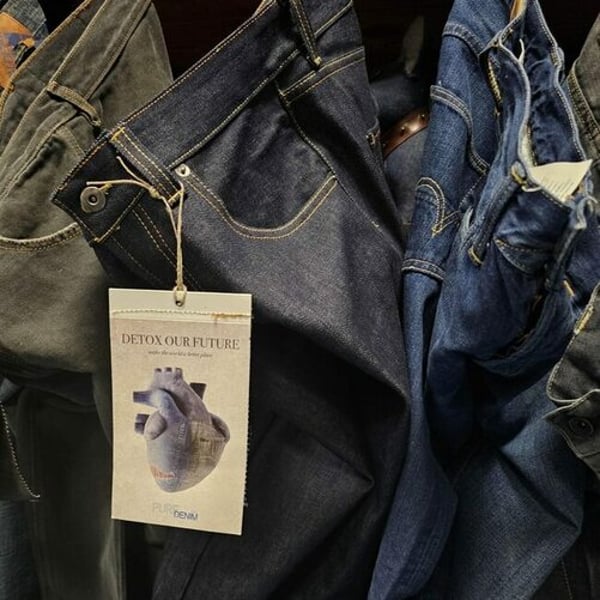Translated by
Nicola Mira
Published
Nov 23, 2023
Italian denim producer PureDenim is a genuine industry trailblazer, having introduced high-tech innovations like ultrasound washing and chemical-free indigo powder dilution. PureDenim is based in Inveruno, about 30 kilometres from Milan, and has developed an array of technology solutions designed to reduce the denim manufacturing process’ environmental impact. The company has unveiled its latest innovation, Color Denim, at the Denim PV trade show, held in Milan on November 21-22.
The Color Denim technology, developed with Zaitex, an Italian chemical company specialised in dyes, makes it possible to dye denim in small quantities while significantly reducing water consumption. “Instead of dyeing the yarn, we work directly on the fabric. With this process, only warp threads are dyed, while weft threads remain white, perfectly replicating the look of denim,” said Luigi Caccia, who founded PureDenim with his sister Ilaria in 2018, speaking to FashionNetwork.com.
“To dye denim using conventional machines, one normally needs to produce at least 3,000 metres [of fabric]. Our new method enables manufacturers to dye only a small amount [of fabric] with the colour required, hence significantly reducing waste and water usage, as well as saving time and money,” said Caccia, who hosted a handful of journalists at his factory on the eve of Denim PV’s first day.
PureDenim rose from the ashes of Italdenim, a company specialising in high-end denim founded in 1974 by Mario Caccia, father of Luigi and Ilaria. From early on, the siblings focused on introducing sustainable products in the family business. The new company is involved in all the different phases of denim production. It uses cotton fibre sourced from Australia, among other countries, processed at a local spinning mill, and oversees dye production, fabric dyeing, washing and finishing, making sure that each step has as little impact as possible on the environment.

“We have actually turned into an R&D hub. We can afford to experiment more because we are small,” said Caccia. His company employs about 20 people, and produces approximately half a million metres of fabric per year, generating an annual revenue comprised between €3.5 million and €4 million. “We have been able to concentrate on several new technologies, some of which are now being used by others, our idea being to share the methods we are developing. We are fortunate in having been able to find in each instance the right industrial partner to support us in developing these technologies,” said Caccia.
He was one of the first producers to use organic cotton, as early as 2007, only to abandon it in 2014, when everyone else began to take an interest in it. “Everyone thought [organic cotton] was the solution, but it still consumes a huge amount of water, and often it isn’t even 100% organic. Too many labels are focused on fabrics, but radically changing paradigms in manufacturing methods can be much more effective. When producing one metre of denim, cotton accounts for only 10% of the pollution impact, and the rest is caused by washing and textile production, so this is where we need to act,” said Caccia, who committed to sustainable transformation in 2014, when PureDenim joined Greenpeace’s Detox programme.
“The jeans sector is a money-making machine, given that a pair of jeans that costs €2 is sold for €40. It’s cheaper to produce jeans with officially certified organic cotton, rather than investing in truly disruptive technologies. The truth is that no one in our sector can claim to be sustainable, because we are part of a market that isn’t,” lamented Caccia. In recent years, PureDenim, whose clients include labels like Dondup from Italy, Closed from Germany, G-Star Raw from the Netherlands, and Edwin from Japan, as well as several luxury labels like Burberry and Marc Jacobs, has managed to shift the boundaries somewhat.
One of PureDenim’s main innovations is Smart Indigo, a machine that transforms indigo powder into liquid dye without using chemicals. Indigo powder is diluted in water by electrolysis, through a chemicals-free process that was developed by Swiss chemist David Crettenand. PureDenim acquired the technology’s license rights for the textile sector, building at its factory the first industrial machine that functions with this technology. Only 20 denim manufacturers worldwide are currently using this method, many of them in Asia, one in South America, and only one in Europe, PureDenim.

With regards to microplastics, extensively found in jeans because of the products used for denim finishing, especially polyvinyl alcohol-based ones, PureDenim has developed NaturalReco, a substance derived from food waste – it uses elements of orange peel – that protects the yarn during finishing. The company has also developed EcoSonic, an ultrasound-based technology for dyeing and washing fabrics that consumes 80% less water compared to traditional methods. In this case, PureDenim joined forces with Israeli start-up Sonovia.
These are significant innovations for the textile industry, especially in terms of the production of denim, which is considered one of the fabrics with the heaviest environmental impact, owing to the vast volumes produced, and the extensive chemicals and water usage required by the manufacturing process.
Copyright © 2023 FashionNetwork.com All rights reserved.







